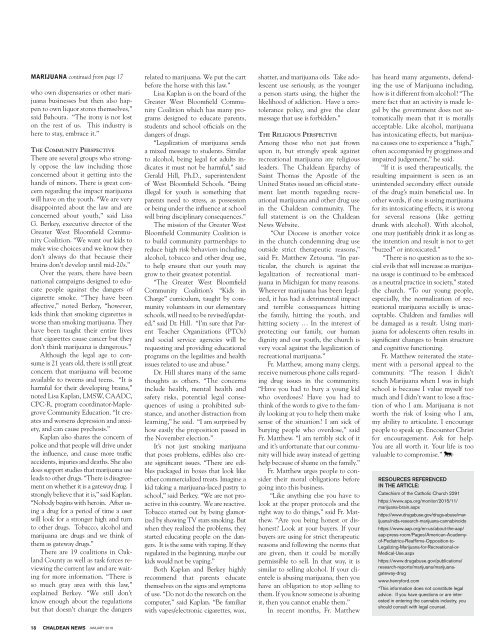JANUARY 2019
Create successful ePaper yourself
Turn your PDF publications into a flip-book with our unique Google optimized e-Paper software.
MARIJUANA continued from page 17<br />
who own dispensaries or other marijuana<br />
businesses but then also happen<br />
to own liquor stores themselves,”<br />
said Bahoura. “The irony is not lost<br />
on the rest of us. This industry is<br />
here to stay, embrace it.”<br />
The Community Perspective<br />
There are several groups who strongly<br />
oppose the law including those<br />
concerned about it getting into the<br />
hands of minors. There is great concern<br />
regarding the impact marijuana<br />
will have on the youth. “We are very<br />
disappointed about the law and are<br />
concerned about youth,” said Lisa<br />
G. Berkey, executive director of the<br />
Greater West Bloomfield Community<br />
Coalition. “We want our kids to<br />
make wise choices and we know they<br />
don’t always do that because their<br />
brains don’t develop until mid-20s.”<br />
Over the years, there have been<br />
national campaigns designed to educate<br />
people against the dangers of<br />
cigarette smoke. “They have been<br />
affective,” noted Berkey, “however,<br />
kids think that smoking cigarettes is<br />
worse than smoking marijuana. They<br />
have been taught their entire lives<br />
that cigarettes cause cancer but they<br />
don’t think marijuana is dangerous.”<br />
Although the legal age to consume<br />
is 21 years old, there is still great<br />
concern that marijuana will become<br />
available to tweens and teens. “It is<br />
harmful for their developing brains,”<br />
noted Lisa Kaplan, LMSW, CAADC,<br />
CPC-R, program coordinator-Maplegrove<br />
Community Education. “It creates<br />
and worsens depression and anxiety,<br />
and can cause psychosis.”<br />
Kaplan also shares the concern of<br />
police and that people will drive under<br />
the influence, and cause more traffic<br />
accidents, injuries and deaths. She also<br />
does support studies that marijuana use<br />
leads to other drugs. “There is disagreement<br />
on whether it is a gateway drug. I<br />
strongly believe that it is,” said Kaplan.<br />
“Nobody begins with heroin. After using<br />
a drug for a period of time a user<br />
will look for a stronger high and turn<br />
to other drugs. Tobacco, alcohol and<br />
marijuana are drugs and we think of<br />
them as gateway drugs.”<br />
There are 19 coalitions in Oakland<br />
County as well as task forces reviewing<br />
the current law and are waiting<br />
for more information. “There is<br />
so much gray area with this law,”<br />
explained Berkey. “We still don’t<br />
know enough about the regulations<br />
but that doesn’t change the dangers<br />
related to marijuana. We put the cart<br />
before the horse with this law.”<br />
Lisa Kaplan is on the board of the<br />
Greater West Bloomfield Community<br />
Coalition which has many programs<br />
designed to educate parents,<br />
students and school officials on the<br />
dangers of drugs.<br />
“Legalization of marijuana sends<br />
a mixed message to students. Similar<br />
to alcohol, being legal for adults indicates<br />
it must not be harmful,” said<br />
Gerald Hill, Ph.D., superintendent<br />
of West Bloomfield Schools. “Being<br />
illegal for youth is something that<br />
parents need to stress, as possession<br />
or being under the influence at school<br />
will bring disciplinary consequences.”<br />
The mission of the Greater West<br />
Bloomfield Community Coalition is<br />
to build community partnerships to<br />
reduce high risk behaviors including<br />
alcohol, tobacco and other drug use,<br />
to help ensure that our youth may<br />
grow to their greatest potential.<br />
“The Greater West Bloomfield<br />
Community Coalition’s “Kids in<br />
Charge” curriculum, taught by community<br />
volunteers in our elementary<br />
schools, will need to be revised/updated,”<br />
said Dr. Hill. “I’m sure that Parent<br />
Teacher Organizations (PTOs)<br />
and social service agencies will be<br />
requesting and providing educational<br />
programs on the legalities and health<br />
issues related to use and abuse.”<br />
Dr. Hill shares many of the same<br />
thoughts as others. “The concerns<br />
include health, mental health and<br />
safety risks, potential legal consequences<br />
of using a prohibited substance,<br />
and another distraction from<br />
learning,” he said. “I am surprised by<br />
how easily the proposition passed in<br />
the November election.”<br />
It’s not just smoking marijuana<br />
that poses problems, edibles also create<br />
significant issues. “There are edibles<br />
packaged in boxes that look like<br />
other commercialized treats. Imagine a<br />
kid taking a marijuana-laced pastry to<br />
school,” said Berkey. “We are not proactive<br />
in this country. We are reactive.<br />
Tobacco started out by being glamorized<br />
by showing TV stars smoking. But<br />
when they realized the problems, they<br />
started educating people on the dangers.<br />
It is the same with vaping. If they<br />
regulated in the beginning, maybe our<br />
kids would not be vaping.”<br />
Both Kaplan and Berkey highly<br />
recommend that parents educate<br />
themselves on the signs and symptoms<br />
of use. “Do not do the research on the<br />
computer,” said Kaplan. “Be familiar<br />
with vapes/electronic cigarettes, wax,<br />
shatter, and marijuana oils. Take adolescent<br />
use seriously, as the younger<br />
a person starts using, the higher the<br />
likelihood of addiction. Have a zerotolerance<br />
policy, and give the clear<br />
message that use is forbidden.”<br />
The Religious Perspective<br />
Among those who not just frown<br />
upon it, but strongly speak against<br />
recreational marijuana are religious<br />
leaders. The Chaldean Eparchy of<br />
Saint Thomas the Apostle of the<br />
United States issued an official statement<br />
last month regarding recreational<br />
marijuana and other drug use<br />
in the Chaldean community. The<br />
full statement is on the Chaldean<br />
News Website.<br />
“Our Diocese is another voice<br />
in the church condemning drug use<br />
outside strict therapeutic reasons,”<br />
said Fr. Matthew Zetouna. “In particular,<br />
the church is against the<br />
legalization of recreational marijuana<br />
in Michigan for many reasons.<br />
Wherever marijuana has been legalized,<br />
it has had a detrimental impact<br />
and terrible consequences hitting<br />
the family, hitting the youth, and<br />
hitting society … In the interest of<br />
protecting our family, our human<br />
dignity and our youth, the church is<br />
very vocal against the legalization of<br />
recreational marijuana.”<br />
Fr. Matthew, among many clergy,<br />
receive numerous phone calls regarding<br />
drug issues in the community.<br />
“Have you had to bury a young kid<br />
who overdoses? Have you had to<br />
think of the words to give to the family<br />
looking at you to help them make<br />
sense of the situation? I am sick of<br />
burying people who overdose,” said<br />
Fr. Matthew. “I am terribly sick of it<br />
and it’s unfortunate that our community<br />
will hide away instead of getting<br />
help because of shame on the family.”<br />
Fr. Matthew urges people to consider<br />
their moral obligations before<br />
going into this business.<br />
“Like anything else you have to<br />
look at the proper protocols and the<br />
right way to do things,” said Fr. Matthew.<br />
“Are you being honest or dishonest?<br />
Look at your buyers. If your<br />
buyers are using for strict therapeutic<br />
reasons and following the norms that<br />
are given, then it could be morally<br />
permissible to sell. In that way, it is<br />
similar to selling alcohol. If your clientele<br />
is abusing marijuana, then you<br />
have an obligation to stop selling to<br />
them. If you know someone is abusing<br />
it, then you cannot enable them.”<br />
In recent months, Fr. Matthew<br />
has heard many arguments, defending<br />
the use of Marijuana including,<br />
how is it different from alcohol? “The<br />
mere fact that an activity is made legal<br />
by the government does not automatically<br />
mean that it is morally<br />
acceptable. Like alcohol, marijuana<br />
has intoxicating effects, but marijuana<br />
causes one to experience a “high,”<br />
often accompanied by grogginess and<br />
impaired judgement,” he said.<br />
“If it is used therapeutically, the<br />
resulting impairment is seen as an<br />
unintended secondary effect outside<br />
of the drug’s main beneficial use. In<br />
other words, if one is using marijuana<br />
for its intoxicating effects, it is wrong<br />
for several reasons (like getting<br />
drunk with alcohol). With alcohol,<br />
one may justifiably drink it as long as<br />
the intention and result is not to get<br />
“buzzed” or intoxicated.”<br />
“There is no question as to the social<br />
evils that will increase as marijuana<br />
usage is continued to be embraced<br />
as a neutral practice in society,” stated<br />
the church. “To our young people,<br />
especially, the normalization of recreational<br />
marijuana socially is unacceptable.<br />
Children and families will<br />
be damaged as a result. Using marijuana<br />
for adolescents often results in<br />
significant changes to brain structure<br />
and cognitive functioning.<br />
Fr. Matthew reiterated the statement<br />
with a personal appeal to the<br />
community. “The reason I didn’t<br />
touch Marijuana when I was in high<br />
school is because I value myself too<br />
much and I didn’t want to lose a fraction<br />
of who I am. Marijuana is not<br />
worth the risk of losing who I am,<br />
my ability to articulate. I encourage<br />
people to speak up. Encounter Christ<br />
for encouragement. Ask for help.<br />
You are all worth it. Your life is too<br />
valuable to compromise.”<br />
RESOURCES REFERENCED<br />
IN THE ARTICLE:<br />
Catechism of the Catholic Church 2291<br />
https://www.apa.org/monitor/2015/11/<br />
marijuana-brain.aspx<br />
https://www.drugabuse.gov/drugs-abuse/marijuana/nida-research-marijuana-cannabinoids<br />
https://www.aap.org/en-us/about-the-aap/<br />
aap-press-room/Pages/American-Academy-<br />
of-Pediatrics-Reaffirms-Opposition-to-<br />
Legalizing-Marijuana-for-Recreational-or-<br />
Medical-Use.aspx<br />
https://www.drugabuse.gov/publications/<br />
research-reports/marijuana/marijuanagateway-drug<br />
www.henryford.com<br />
*This information does not constitute legal<br />
advice. If you have questions or are interested<br />
in entering the cannabis industry, you<br />
should consult with legal counsel.<br />
18 CHALDEAN NEWS <strong>JANUARY</strong> <strong>2019</strong>

















